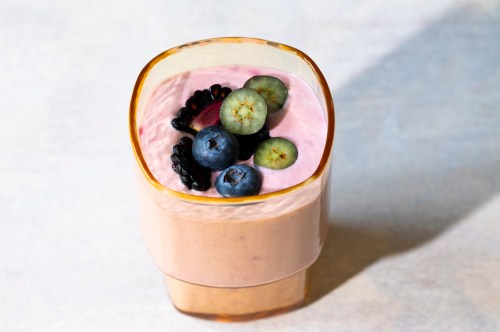Our editors independently select these products. Making a purchase through our links may earn Well+Good a commission
For Smoothies That Boost Digestion and Balance Your Microbiome, Add Sprouts (Says a Gastro)
Discover how to make this gastroenterologist-designed, four-ingredient broccoli sprouts smoothie recipe for optimal gut health.

When it comes to making smoothies, there’s a short list of usual suspects that tend to make their way into the blender: alt-milk, protein powder, spinach, berries, bananas. But Will Bulsiewicz, MD, a gastroenterologist and New York Times bestselling author of The Fiber Fueled Cookbook, has a favorite smoothie ingredient for gut health that’s a little more unexpected.
Experts in This Article
South Carolina-based gastroenterologist and author of Fiber Fueled
This gastroenterologist’s winner-winner ingredient for gut healthy bevs? Broccoli sprouts. You heard that right. “I am utterly obsessed with putting broccoli sprouts in my smoothie—it’s my secret weapon,” Dr. Bulsiewicz says. Although these mighty greens might not sound like the obvious smoothie-making choice (at least not in terms of flavor), the gut health experts reassures us that it’s well-worth a try. With the right blend of ingredients, all you’ll be reaping from the broccoli sprouts is the bevy of gut health benefits they have to offer (with no icky aftertaste). Ready to get blending?
A gastroenterologist’s favorite smoothie recipe for optimal gut health
In a recent Instagram post, Dr. Bulsiewicz shared his four-ingredient broccoli sprouts smoothie recipe that he drinks daily. It’s a basic combination of four “core” ingredients, and you likely have at least three of ‘em already sitting in your refrigerator or pantry: frozen blueberries, bananas, soy milk, and (the star of the show) broccoli sprouts. Although the combination may sound too-good-to-be-true simple, Dr. Bulsiewicz has crafted this smoothie recipe by methodically choosing ingredients that each support healthy digestion. Let’s dig in.
Blueberries
For starters, blueberries are packed with prebiotic fiber, which feed the good bacteria in the gut. Layered upon the fact that these tiny blue morsels are also considered one of the best foods for reducing gut inflammation (hi, antioxidants), it’s no surprise that Dr. Bulsiewicz likes to include them in his daily morning routine. Plus, it doesn’t hurt that blueberries are tasty as can be—sweet, floral, with a touch of tanginess. What more could you want from the humble bluebs?
Bananas
Then, there are bananas: a must-have household staple when it comes to gut health. Also loaded with the same prebiotic fiber we know and love found in blueberries, bananas travel through the digestive system while lending a helping hand, supporting the probiotics living in the gut. But to up the ante, dietitians recommend opting for a slightly underripe banana that offers a special type of fiber called resistant starch that acts as a prebiotic and feeds healthy gut bacteria to promote a balanced microbiome. A win-win.
Soy Milk
When we previously asked Dr. Bulsiewicz about his number one type of plant-based milk for gut health, he said the answer was simple: it’s hands-down soy milk. “Research has suggested that soy milk induces changes in the gut microbiome that are beneficial, such as increasing Bifidobacteria levels,” Dr. Bulsiewicz says. (BTW, bifidobacteria is a type of good bacteria that lives in your gut that plays an important role in digestion and breaking down complex carbohydrates.) And these are just a few of the many soy milk benefits that range from preventing inflammation to improving bone health, to name a few. Pro tip: For extra gut health brownie points, the gastro recommends opting for organic soy milk whenever possible
Broccoli Sprouts
Finally, the moment we’ve all been waiting for: the broccoli sprouts. Adding greens into smoothies is far from new; however, most iterations will call for a handful of spinach or kale. But not this broccoli sprouts smoothie recipe. “Broccoli sprouts release a phytochemical called sulforaphane, which causes them to taste bitter,” Dr. Bulsiewicz says. “I say, embrace the bitterness! Sulforaphane [a phytochemical] is absolutely incredible. It heals the gut, reduces inflammation, and [could help] fight cancer.” What’s more, he says broccoli sprouts have a much higher amount of sulforaphane than mature broccoli, which is why he suggests going the sprouted route versus using mature broccoli.
Best part? You can sprout your own broccoli seeds in water at home using an indoor hydroponic gardening system like Ingarden, but you can also buy broccoli sprouts at many grocery stores. Plus, since a little goes a long way, you can still have your go-to smoothie and just incorporate the broccoli sprouts right in it (without overpowering the flavor whatsoever). The key to keeping this broccoli sprouts smoothie recipe tasting yummy is balancing out the bitterness with something sweet or tart—like berries or a banana—which are key to Dr. Bulsiewicz’s concoction.
One brain-boosting smoothie bowl coming right up:
Sign Up for Our Daily Newsletter
Get all the latest in wellness, trends, food, fitness, beauty, and more delivered right to your inbox.
Got it, you've been added to our email list.









